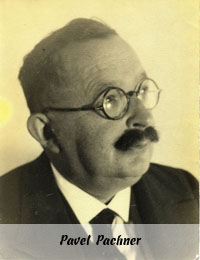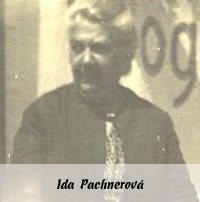OUR FINDINGS
PAVEL PACHNER

Pavel Pachner was born on February 20, 1876, in Německý Brod. He attended the Německý Brod highschool from 1887 to 1890. He took over his fathers drug store "U Černého psa" ("The Black Dog Drugstore"), as well as running a shop with photographic equipment and a fuel station. The drugstore had an advertisement at the local cinema: "Paints, polish and oils - all the door requires. The Black Dog Drugstore, Dolní ulice" After his brother Oskar's death in 1937, he became the owner of the house at 104 Dolní Street as well as a liquor and wine store despite not being a drinker himself. He cultivated the business and, among other things, he supplied confectioneries all over the country with fruit syrups and rum.
Some people remember Pavel's store to this day in Havlíčkův Brod - they describe it as a single small room with a black counter in the middle and black shelves in the back. The upper levels of the shelves had glass panes behind which bottles were displayed. Faithful customers would receive a flask of rum before each Christmas for free.

Pavel liked to spoil his grandchildren; he would give them sweets from large jars he kept in the store. He had two daughters with his wife Ida, born June 27, 1878 - and Zdeňka and Hanna. Ida's maiden name was Morgenstern and she came from Prague. She wore beautiful, long hair tied up in a bun. Milena, her granddaughter, recalls that she cut them short before her departure to Terezín.
Zdeňka was born on March 13, 1904. She attended the Německý Brod highschool between the years 1918 and 1925. She then studied at the Philosophical Faculty in Brno and became a teacher of Czech and French languages at the Jihlava highschool. She married Břetislav Kovařík, a biology teacher and had two sons with him. They had to leave Jihlava during the war and live in Třebíč. Just like her sister, Zdeňka divorced her husband during the war and was deported to Terezín with the Dt transport on January 10, 1944, where she worked at the children's home. She, too, survived there till the end of the war.

Dcera Zdeňka se narodila 13. března 1904. V letech 1918-1925 studovala na Gymnáziu v Německém Brodě. Vystudovala Filozofickou fakultu v Brně, stala se profesorkou českého a francouzského jazyka a vyučovala na Gymnáziu v Jihlavě. Vzala si profesora biologie Břetislava Kovaříka. Měli dva syny. Za války museli Jihlavu opustit a přestěhovat se do Třebíče. Zdeňka se stejně jako její sestra za války rozvedla a transportem Dt dne 10. ledna 1944 byla odsunuta do Terezína, kde pracovala v dětském útulku. I ona se v Terezíně dočkala konce války.
Their daughter Hanna was born on February 12, 1908. She attended the Německý Brod highschool between 1918 and 1926 before going on to study pharmacology at Charles University in Prague. She never finished her studies, because she married Bohumil Dymeš, a doctor of law, who worked at Neuern's law firm in Německý Brod once he completed his studies. After the wedding, they moved to Most - the Czech mayor of Most was Dr. Dymeš. Once the Sudetenland was taken by Germany, they had to move out to Prague. She divorced her husband during the war in order to save her daughter Milena and was deported to Terezín with transport Dt, on January 10, 1944, from Prague. In Terezín, she worked at the pharmacy till the end of the war. For the entire 14 months of separation, Hanna kept her connection with her daughter alive through letters. Letters coming in and out of Terezín were, however, dry and impersonal because they were reviewed before they were let through, and they had to be written in German. Towards the end of the war, the gestapo even arrested Dr. Dymeš and the young Milena was in danger of being "reeducated" in Germany. Fortunately, her uncle became her guardian and she remained with him till the end of the war. Hanna died on September 19, 1989.
The sisters however, did not meet their parents in Terezín. Pavel and Ida left Německý Brod for Prague in 1939 and were deported from there to Terezín with the At transport on May 7, 1942. They were immediately sent with the Ax transport, on May 9, 1942, to the Sobibor extermination camp (Poland). Their later fate is unknown, but in light of their age, they likely died shortly thereafter.
